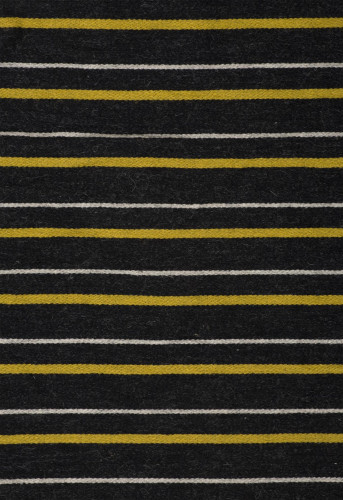154/1996
Collection
Textiles
Brief description
Length of furnishing fabric made from wool or wool mix, woven with a design of white and yellow stripes on a black ground, manufactured c.1958. This textile length was donated to the museum by the original owner and there is a Documenting Homes collection, 185/2010, associated with this object.
Object name
textile length
textile length
textile length
Object number
154/1996
Production date
c.1958 (manufactured)
Period
Twentieth century (1900-1999)
Material
wool
Technique
machine woven
Physical description
Piece of wool or wool mix furnishing textile with a black ground woven with a white and yellow stripe design.
Dimensions
Length: 103.3cm
Width: 189cm
Width: 189cm
Website keywords
textiles
window treatments
window treatments
Label
Label text, Geffrye Museum, date unknown:
Furnishing Textile, Used For Curtains, Wool, c1959.
Caption for Exploring 20th Century London website:
This material is a spare piece of fabric that was used for curtains in the late 1950s or early 1960s in a family home in Hillside Gardens on the Southwood House Estate in Highgate. The curtains were hung with the stripe running horizontally. The owner bought the house from new for £5,050 in 1958 and had a successful career in the pharmaceutical industry. The estate of 43 houses was designed by the architect Harley Sherlock and the houses were built in the modern, open plan style with large picture windows, and parquet flooring. According to a history of the estate one of the residents wrote that the houses appealed to people who 'preferred Heal's to Maples' and the communal gardens attracted young families with children.
Furnishing Textile, Used For Curtains, Wool, c1959.
Caption for Exploring 20th Century London website:
This material is a spare piece of fabric that was used for curtains in the late 1950s or early 1960s in a family home in Hillside Gardens on the Southwood House Estate in Highgate. The curtains were hung with the stripe running horizontally. The owner bought the house from new for £5,050 in 1958 and had a successful career in the pharmaceutical industry. The estate of 43 houses was designed by the architect Harley Sherlock and the houses were built in the modern, open plan style with large picture windows, and parquet flooring. According to a history of the estate one of the residents wrote that the houses appealed to people who 'preferred Heal's to Maples' and the communal gardens attracted young families with children.




